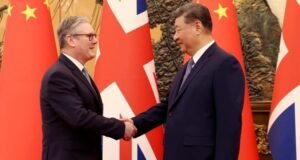
The ruins of Hadleigh Castle. Courtesy Library of Congress on Flckr Commons https://flic.kr/p/fuUt7n
Daniel Meissler, in his technology and security newsletter, Unsupervised Learning, writes about the broad reasons for thinking China is winning (or will win) and a couple reasons why China may stumble:
The arguments that they’re ascending are easy: So many people, so many people getting a good education, they’re stealing the world’s intellectual property, they’re becoming the world’s dominant bullies, which they can because they make everything for everyone, and they also have a functioning government that is thinking very long-term about the success of the country (which the US does not have). The arguments for China’s fall are far less discussed, but they include a huge problem of not having enough young people, a major real estate crash, and the fact that so many smart young people are not actually in China because they left to the US or Canada or Europe.
Meissler links to a Forbes article, “Is China in Decline?”, which points to several other considerations of relative health of societies. Income inequality in America is a source of distress. Political polarization based on the two-party system could be read as another dysfunction. On the other hand, dictatorships may fail to take in important counterpoints leading to “catastrophic strategic error”.
In The Final Struggle: Inside China’s Global Strategy, Ian Easton compares China to America across 14 “Top-level measures of Strategic Advantage”. On the five questions regarding competitive strategy, motivation, leadership, and planning, China has the upper hand. It also has a stronger trade network today. But, the United States has a better system for processing competing ideas and replacing leaders, has better research institutions, has stronger defense (and defense partners), and is still the larger economy.
Which side will prevail? Easton suggests this is going to be hard (if not impossible) question to answer definitely. “How might we judge which side is ahead in the global superpower race. This is a squishy problem. It is large, complex, and unstructured,” he writes. Much of the battle between the superpowers is classified involving the competition for weapons technology, and the wrangling of the intelligence agencies.
It is impossible to know which side will win out, or if we’ll end up with some kind of integration of the two systems. Yet, it is important to remember the differences in governance and social structure, because it does matter who wins. Under Chinese Communist dictatorship, what freedoms would we have to ask how well the system is working? We could ask the Chinese people, except for that fact that their overlords have decided that they shouldn’t have free(as in freedom) access to the Internet.











